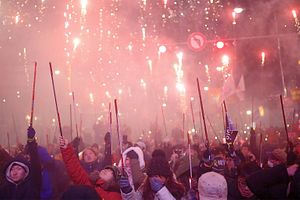South Korea is at a crossroads. After nearly a decade of conservative rule, the stage appears set for the return of a liberal government. An influence-peddling and corruption scandal mobilized millions of anti-government protesters and led eventually to the legislature’s impeachment of President Park Geun-hye. Two former presidential aides have been arrested and prosecutors are investigating the vice chairman of the electronics conglomerate Samsung, Lee Jay-yong, on bribery and embezzlement charges related to the scandal. Amidst the fallout, support for the president has plummeted and the ruling Saenuri Party has split.
Scandal engulfed the domestic political scene after the revelation last October of evidence that showed Park had been consulting a longtime family friend and private citizen, Choi Soon-sil, on confidential affairs of state. Subsequent investigations found evidence that Choi, in cooperation with presidential staff and possibly the president, had extorted more than $50 million from South Korean conglomerates. Park was impeached on December 6, 2016 with 234 members of the 300-member National Assembly casting their votes in favor of the motion. With Park relieved from her official responsibilities as head of state while the impeachment motion is considered by the Constitutional Court, Prime Minister Hwang Kyo-ahn is acting president until a decision is rendered.
The Constitutional Court has until June to decide whether to uphold the motion and remove the president, or strike it down and have Park reinstated. If the Court votes in the affirmative, snap elections must be held within 60 days. This means an early presidential election. If she is reinstated, Park will limp to the conclusion of her five-year term as a discredited lame duck, and the presidential election will be held on December 20, as originally scheduled. Presidents in South Korea are limited to one term, so there was never any consideration of a reelection campaign.
































